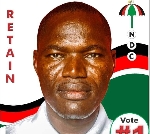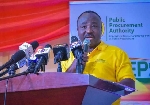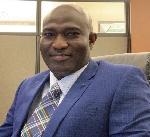Thinking legally about the new voter register
 Ghana's voter register
Ghana's voter register
Probably, nothing threatens Ghana’s peace and democratic credentials more than the sensation of fear encircling the compilation of a New Voters’ Register. In fact, the power to curb this fear lies squarely with the Electoral Commission, to act fairly and reasonably with all actors as we approach the 2020 general election.
True, voter register demonstration and its related violence is not new in our polity. Some five years ago, the then opposition NPP held a demonstration, calling for a new voter register. Sadly, the demonstration culminated into a tragic death of one Justice Adzakuma which. the voters never forgot and somehow punished the then NDC government at the 2016 polls.
However, it has become obvious in our current polity even to the oracles of high punditry that the compilation of a new voters’ register has, somewhat, gingered a sensation of fear, whether real or imagined, subliminal or superliminal, in our polity.
In fact, if the 2018 Ayawaso by-election and its related violence, where scores of people were injured, some with blood-oozing through their legs, some with gun-shots penetrating through their residential walls, some with gun bullets flying all over their neighbourhood and others, incontinent with rage and embarrassment, is of any guide, then it stands to reason that all members of society must be wary of the future, vigilant of the next election and contribute to ensuring a peaceful 2020 election.
As a man of law, I dare to examine the legality of the proposed New Voter Register by the Electoral Commission I do not dare to write to make an iconoclastic attack of the Electoral Commission. No, not at all. I dare to write in search of peace as we tip-toe into the December 2020 election.
According to the Electoral Commission the current voters' register is overstretched and, therefore, a compilation of a new one will protect its credibility. It goes further to argue that the current register is not fit for purpose and that a new incoming register will be enhanced with better security features. It estimates the cost for the new register in the gargantuan sum of almost four hundred million Ghana cedis (US$71million) for a third world or developing economy as Ghana.
However, the drafters of the 1992 constitution specifically empowered the Electoral Commission with these clear and unambiguous words in article 45(a) as follows.
“the electoral commission shall have the following functions:
- To compile the register of voters and revise it at such periods as may be determined by law
Thus, a textual reading of the essential elements for the EC are as follows: a) compile a voter register, b) revise it as such periods, c) as may be determined by law
Compile Voter Register
Firstly, the first sentence in article 45(a) before the conjunctive word “and” is that the electoral commission shall…compile the register of voters. In fact, this function was accomplished by the then former EC Commissioner, Mr. Afari-Djan.
Indeed, on all accounts, the current voter register has proven credible to express the sovereign will of the people in the recently-held district assembly election; proven credible to express the sovereign will of the people to elect President John Mahama in 2012; proven credible to express the sovereign will of the people to elect President Akufo Addo in 2016; proven credible to express the sovereign will of the people in the 2018 referendum to create six new regions. Why spend a colossal GHC400 million cedis (US$71million) to replace a functioning voters’ register which has proven credible to express the sovereign will of the people.
Is the electoral commission, therefore, suggesting that we should cast doubt on the meaning of article 45(a)? suggesting that we add some additional words into article 45a to justify a new register? Is the Commission saying that the Constitutional drafters of article 45a are incompetent?
In fact, a solicitous reading reveals that the constitutional drafters did not say in article 45a that the Electoral commission shall create
a) a new or improved register of voters,
b) protect the credibility of any new or improved register or
c) create a new register with security features
Indeed, it is presumed that legal drafters, especially constitutional drafters are careful users of language and that they mean what they say and say what they mean in a constitutional provision.
Respectfully, what has precipitously changed in the last few months in this election year to warrant a demand for a new voter’s register.?
Revise it at such periods…
A second element in article 45(a) of the 1992 constitution worthy of attention is the timing to revise the register. Solicitously speaking article 45(a) does not tell a reader of statutes when or which periods to revise a voter’s register.
In fact, the words, after the conjunctive word “and’ in 45(a) reads as follows …and revise it at such periods…Does the phrase mean that the voters' register can be revised in the year of elections? What is the meaning of periods in article 45a. Can the Black’s Law Dictionary assist us here to define the meaning of periods in this context?
It is very doubtful that in the year of election, as the nation finds itself the Election Commission which, by practice, is very preoccupied with other major tasks, such as
a) to prepare the necessary election materials for the election,
b) to provide the necessary voter education to the electorate,
c) to train election officers across the country,
d) engage political parties on election modalities
e), liaise with international election observers and
f) when the Political Parties are very busy touring all parts of the country campaigning, the drafters of article 45a also in their wisdom intended that the period for the EC to revise the voters register should be within the year of election
…As May Be Determined By Law
In fact, a textual reading of article 45a in its entirety reveals that any revision of the register is a matter of law to be determined.
But even Parliament which has oversight responsibility over the Electoral Commission cannot determine the words: revise the register at such periods as may be determined by law in a capricious or arbitrary manner knowing that we are in an election year
What then is the Solution?
Solicitously speaking article 23 of the Constitution offers harmony and coherence between the conduct of the Electoral Commission and how to revise the new voters register. It reads “Administrative bodies and administrative officials shall act fairly and reasonably and comply with the requirements imposed on them by law…”.
Thus, in the case of the Electoral Commission, acting as an administrative body on behalf of the state, the requirement imposed upon it by law within the language is Article 45a as far as the voter register is concerned.
The duty to act fairly and reasonably imposed on the EC in article 23 to revise the voters register include the duty to disclose, involve, and solicit the views and opinions of all political parties and stakeholders and submit a copy of the IT Consultants' report to the committee of parliament for their response
Respectfully the interest of the major stakeholders cannot and must not be underrated in a free and democratic Ghana. The Electoral Commission therefore must build trust and confidence amongst all stakeholders in our polity.
This is what Article 3 of the Protocol on Democracy and Good Governance (A/SP1/12/01) Ecowas Treaty was referring to when it stated in its Article 3 as follows:
“The bodies responsible for organizing the elections shall be independent or neutral and shall have the confidence of all the political actors ...”
Truly, if any nation can exercise the confidence of all its political actors through the framework of fairness and fair play with all stakeholders to avert any calamity, it is Ghana and the EC must get this right.
At least we owe it to Ghana, in the exercise of the sovereign will of the people under Article 1 of the 1992 Constitution, to give peace an honest try.
Trending News

UE/R NDC comms. bureau suspends party activities to mourn Agorogo
10:17
Ejisu roads see massive overhaul ahead of by-election
09:52
Election stakeholders schooled on Internet shutdown
10:32
Court discharges former PPA boss Adjenim Boateng
11:14
British High Commission donates protective equipment worth £260,000 to GAF
09:12
Dec 7 polls: Let’s stay united, do away with internal disputes – Asiedu Nketiah to NDC members
12:51
Pension: Public sector workers to strike May 2
10:18
NPP Performance Tracker emphasizes toilets over substantive infrastructure dev’t projects — Dr. Sa-ad Iddrisu
09:00
Free SHS: Market women laud policy for bridging inequality in education
09:47
MFC decries NPP's bribery of supporters
10:11



